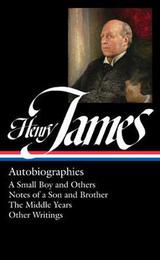
|
Henry James: Autobiographies: A Small Boy and Others / Notes of a Son and Brother / The Middle Years / Other Writings
Hardback
Main Details
| Title |
Henry James: Autobiographies: A Small Boy and Others / Notes of a Son and Brother / The Middle Years / Other Writings
|
| Authors and Contributors |
By (author) Henry James
|
|
Edited by Philip Horne
|
| Physical Properties |
| Format:Hardback | | Pages:858 | | Dimensions(mm): Height 205,Width 130 |
|
| Category/Genre | Literary studies - c 1800 to c 1900
Literary studies - fiction, novelists and prose writers |
|---|
| ISBN/Barcode |
9781598534719
|
| Classifications | Dewey:813.4 |
|---|
| Audience | |
|---|
| Illustrations |
8 Illustrations, unspecified
|
|
Publishing Details |
| Publisher |
The Library of America
|
| Imprint |
The Library of America
|
| Publication Date |
26 January 2016 |
| Publication Country |
United States
|
Description
A gripping collection of autobiographical writings from one of America's most supreme novelists, published to mark the 100th anniversary of his death. Not only do these works offer an intimate and extensive glimpse into Henry James the writer, they also allow a look into his infamous family, as well as paint the portrait of an era. Includes: A Small Boy and Others; Notes of a Son and Brother; The Middle Years and a selection of eight other personal reminiscences.
Author Biography
PhilipHorne, editor, isProfessor of English, University College London. He is the author ofHenry James- A Life in Letters(1999) andHenryJamesand Revision- The New York Edition(1990). Founding General Editor of Cambridge University Press's Complete Fiction of HenryJamesseries,he is currently working on a book onJames's relationship with Theodore Roosevelt.
Reviews"For freshness of voice, firmness of purpose (if a firmness always subject to scruples and second thoughts), and general delight on the page, the memoirs are fully alive to the contemporary reader. . . . James's memoirs have a shimmer, a charm, and an openhearted immediacy. . . . They remind us that sophistication of style and sincerity of purpose are still the best of literary brothers." -Adam Gopnik, The New Yorker
|